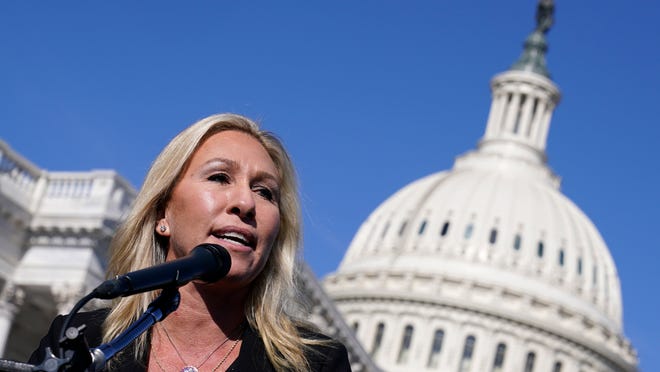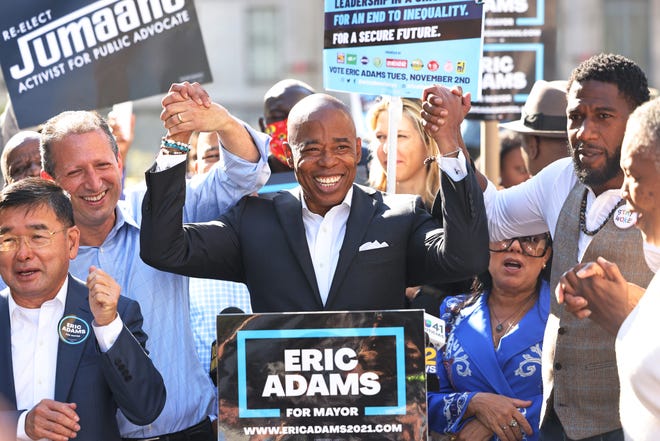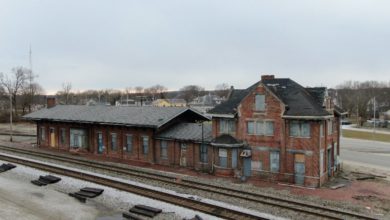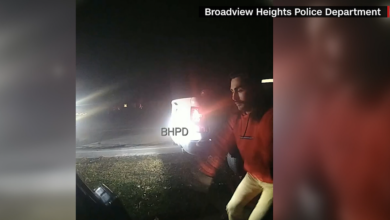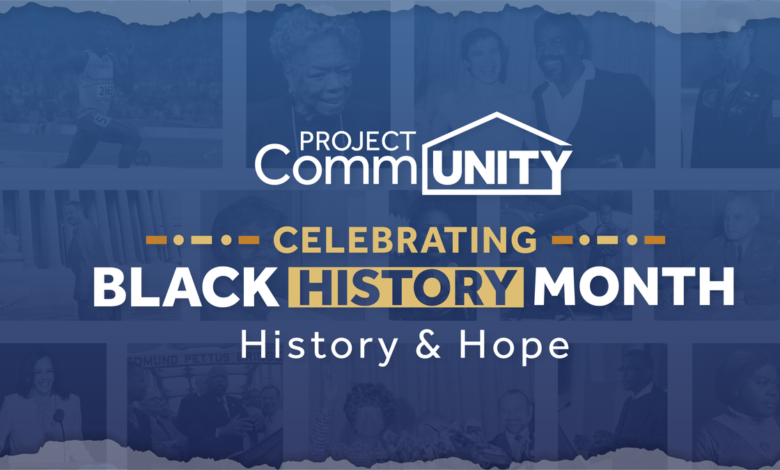

George Starke Jr. was the first African American to ever attend the University of Florida Law School.Grainy footage shows a nervous Mr. Starke on campus receiving his registration packet. There was a row separating him from his white classmates on their first day."On Sept. 15, 1958, when I went to University of Florida, I didn't know what to expect," Starke said."I got to meet some of my classmates. Some of who really weren't my classmates, I didn't know it at the time. Two of them were Florida Highway Patrol. They had been assigned to ensure my safety. They didn't know what to expect either. Except that my name did come up once in awhile in Klan meetings. I didn't know about it until later because they were able to keep that information away from me," Starke said. It wasn't the first time the focus had been on Mr. Starke in what would otherwise be a segregated part of life. Years earlier, Airman Starke was selected to participate in a ribbon-cutting ceremony for a brand new building on the Kisarazu Air base in Japan. The humble veteran of the Air Force downplays his achievement. Only to say he went to Japan at the end of the Korean War. At the time, the military was recently integrated by President Harry Truman.Mr. Starke grew up in the historically Black Parramore neighborhood of Orlando. He was slated to attend Jones High School, an all-Black institution, instead his parents sent him to a boarding school in North Carolina. For undergrad, he attended Morehouse College in Atlanta. An experience that would shape his future.Starke was in Atlanta at a time when Dr. Martin Luther King Jr. was beginning to make his mark on the world."Well, he gave my graduation speech at Morehouse. And I knew his brother from high school. And I know a few of the people that he knew. And so naturally I was impressed with what he was doing," Starke said of his interaction with King. He says a great deal of change happened because it forced people to see what segregation was doing to people.Mr. Starke says the same war for equality that was raging in the 50s and 60s, is the one marchers in the street are fighting today after high profile incidents including the death of George Floyd."Back then my focus was primarily on what was going on at the University of Florida and what was going on at other schools in the south. I remember when James Meredith in Mississippi was shot and they later built a monument to him on campus."James Meredith was shot by a sniper after he became the first African American to attend the University of Mississippi. Also an Air Force veteran, Starke couldn't help but follow violence toward groundbreakers like himself to ensure he was ready for anything."People in our society and our culture who never thought of things like that before George Floyd, seeing what happened to him. Knowing the difference between what's right and wrong. And of course this has been going on since 1614 or 1416. That's a long time to break all those habits. Although people can't blame themselves for what happened 400 years ago, there's still a legacy and much of those problems still need attention," Starke said.Mr. Starke didn't graduate from Florida law in the 1950s. His departure from the university was documented in the campus newspaper. Instead he went to New York City and entered the world of corporate finance, serving in top roles with numerous Wall Street companies. His legacy includes one son and daughter in law, plus two grandkids. Before him, Starke's father, Dr. George Starke, was the first African American to gain membership in the Florida Medical Association and opened a practice in Sanford, Florida."I wouldn't say it was easy by any means. Finding the quality of employment that I was looking for was in fact difficult. Took a lot of time to get on the right track. Well, when I was growing up, you know, there are limits on where you could go. What you could do. Today, they're more subtle. There may be some limits, but then other avenues open to offset that. No restrictions basically on what a person growing up today can do if they prepare themselves to do it," Starke said. He has a simple message for those coming up today."Do the best you're capable of doing. Come out and be involved in the community. Work for causes you identify with and accomplish as much as you can. Learn as much as you can. Keep learning new things all your life," Starke said. Starke was given the University of Florida's distinguished alumnus award in 2009. In 1998 and again in 2018, he was honored by UF Law's Center for the Study of Race and Race relations.
George Starke Jr. was the first African American to ever attend the University of Florida Law School.
Grainy footage shows a nervous Mr. Starke on campus receiving his registration packet. There was a row separating him from his white classmates on their first day.
"On Sept. 15, 1958, when I went to University of Florida, I didn't know what to expect," Starke said.
"I got to meet some of my classmates. Some of who really weren't my classmates, I didn't know it at the time. Two of them were Florida Highway Patrol. They had been assigned to ensure my safety. They didn't know what to expect either. Except that my name did come up once in awhile in Klan meetings. I didn't know about it until later because they were able to keep that information away from me," Starke said.
It wasn't the first time the focus had been on Mr. Starke in what would otherwise be a segregated part of life.
Years earlier, Airman Starke was selected to participate in a ribbon-cutting ceremony for a brand new building on the Kisarazu Air base in Japan. The humble veteran of the Air Force downplays his achievement. Only to say he went to Japan at the end of the Korean War. At the time, the military was recently integrated by President Harry Truman.
Mr. Starke grew up in the historically Black Parramore neighborhood of Orlando. He was slated to attend Jones High School, an all-Black institution, instead his parents sent him to a boarding school in North Carolina. For undergrad, he attended Morehouse College in Atlanta. An experience that would shape his future.
Starke was in Atlanta at a time when Dr. Martin Luther King Jr. was beginning to make his mark on the world.
"Well, he gave my graduation speech at Morehouse. And I knew his brother from high school. And I know a few of the people that he knew. And so naturally I was impressed with what he was doing," Starke said of his interaction with King. He says a great deal of change happened because it forced people to see what segregation was doing to people.
Mr. Starke says the same war for equality that was raging in the 50s and 60s, is the one marchers in the street are fighting today after high profile incidents including the death of George Floyd.
"Back then my focus was primarily on what was going on at the University of Florida and what was going on at other schools in the south. I remember when James Meredith in Mississippi was shot and they later built a monument to him on campus."
James Meredith was shot by a sniper after he became the first African American to attend the University of Mississippi. Also an Air Force veteran, Starke couldn't help but follow violence toward groundbreakers like himself to ensure he was ready for anything.
"People in our society and our culture who never thought of things like that before George Floyd, seeing what happened to him. Knowing the difference between what's right and wrong. And of course this has been going on since 1614 or 1416. That's a long time to break all those habits. Although people can't blame themselves for what happened 400 years ago, there's still a legacy and much of those problems still need attention," Starke said.
Mr. Starke didn't graduate from Florida law in the 1950s. His departure from the university was documented in the campus newspaper.
Instead he went to New York City and entered the world of corporate finance, serving in top roles with numerous Wall Street companies. His legacy includes one son and daughter in law, plus two grandkids. Before him, Starke's father, Dr. George Starke, was the first African American to gain membership in the Florida Medical Association and opened a practice in Sanford, Florida.
"I wouldn't say it was easy by any means. Finding the quality of employment that I was looking for was in fact difficult. Took a lot of time to get on the right track. Well, when I was growing up, you know, there are limits on where you could go. What you could do. Today, they're more subtle. There may be some limits, but then other avenues open to offset that. No restrictions basically on what a person growing up today can do if they prepare themselves to do it," Starke said.
He has a simple message for those coming up today.
"Do the best you're capable of doing. Come out and be involved in the community. Work for causes you identify with and accomplish as much as you can. Learn as much as you can. Keep learning new things all your life," Starke said.
Starke was given the University of Florida's distinguished alumnus award in 2009. In 1998 and again in 2018, he was honored by UF Law's Center for the Study of Race and Race relations.
Source link

